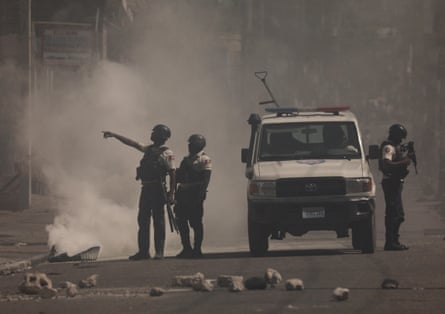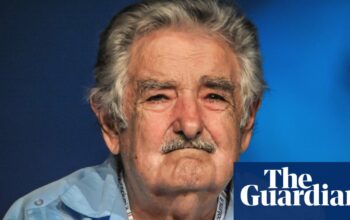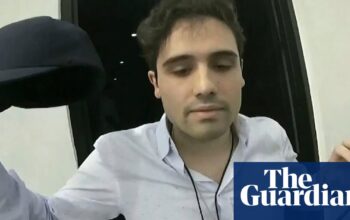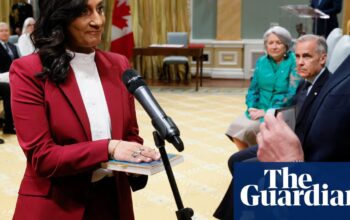The fate of Haiti’s leadership is now unclear as armed groups stormed the nation’s main airport and released over 3,800 inmates over the weekend. This seems to be a planned move to overthrow the current prime minister, Ariel Henry.
Haiti’s leaders have announced a state of emergency lasting three days and a curfew at night in an attempt to quell the increasing turmoil. However, the national police force is outmatched and high-level officials, including Henry who is currently acting as president, are currently abroad.
The government’s actions were taken in response to a weekend characterized by extreme violence in Haiti, reaching a new point of concern. As a result, the US is recommending that its citizens evacuate quickly, and Canada has temporarily shut down its embassy.
A few hours after the order was issued, heavily armed individuals initiated a fresh assault on the primary airport of the nation on Monday. This resulted in an exchange of gunfire between them and local law enforcement and military personnel.
Jimmy Chérizier, a previously high-ranking police officer known as Barbecue who currently leads a coalition of gangs, has taken credit for the attacks. He stated that the aim was to apprehend the Police Chief and government officials of Haiti, and obstruct the return of Henry.
Nine individuals have lost their lives since Thursday, including four members of law enforcement. Multiple locations, such as police stations, the airport, and the national football stadium, have been targeted. During one incident at the stadium, a staff member was held captive for a prolonged period of time.
According to the United Nations, approximately 15,000 individuals were compelled to escape the turmoil between Thursday and Saturday. This includes those who were already residing in temporary camps for displaced persons, which were established in schools, hospitals, and public spaces in the capital city of Port-au-Prince.
The daring escape of dangerous criminals and influential gang leaders was a bold demonstration of power by the nation’s street gangs, highlighting a crucial point for global initiatives to support the government and bring stability back to the Caribbean country, according to analysts.
Diego Da Rin, an analyst at the International Crisis Group, believes that we may be at a crucial moment where gangs are teaming up to overthrow the government and intimidate absent politicians from returning.
Haiti has descended into increased turmoil and disorder following the assassination of its president, Jovenel Moïse, by Colombian mercenaries in July 2021. As a result, Ariel Henry has been sworn in as interim leader.
According to the UN, over 8,400 individuals in Haiti were subjected to violent acts by gangs last year. The nation, which is plagued by conflict, is currently facing levels of hunger that have been described as unprecedented and catastrophic.

Display the picture in full-screen mode.
Henry traveled to Nairobi last week in an attempt to recruit 1,000 Kenyan police officers to reclaim control of the country from the armed groups who currently hold the majority of the capital city.
During his absence, the gangs delivered a clear message by carrying out organized attacks on Port-au-Prince’s primary international airport, police stations, and major prisons, sending a warning to the government and international community.
Over 3,800 individuals incarcerated for offenses such as murder and kidnapping reportedly fled from the National Penitentiary on Saturday. In addition, numerous prisoners escaped from the Croix des Bouquets prison, which is located on the outskirts of the city and has a capacity of approximately 1,500 inmates.
On Sunday, the primary prison in Port-au-Prince, which usually has an excessive number of inmates and makes up a quarter of Haiti’s imprisoned citizens, was noticeably unoccupied. No prison guards were seen and the concrete patio was littered with plastic sandals, clothing, and furniture. Three corpses with gunshot injuries were also found at the entrance of the prison.
In another neighbourhood, the bloodied corpses of two men with their hands tied behind the backs lay face down as residents walked past roadblocks set up with burning tires.
The American embassy in Port-au-Prince urged its citizens to depart Haiti “as early as possible” on Sunday, while the French embassy announced the suspension of visa services.
The united attack by rival gangs, known for fighting over territory, is a significant display of strength and an effort to prove that they must be included in the resolution of Haiti’s severe and ongoing issues, according to Da Rin.
He stated that the gangs have the ability to manipulate Haiti’s state at their disposal.
On Sunday, the government declared a curfew in an attempt to reduce the violence. Meanwhile, security forces have promised to employ all legal methods to combat the gangs. However, the country’s police force is outmatched and lacking in numbers, and their president is not elected, widely disliked, and currently absent.
Haiti’s police force has a total of approximately 9,000 officers, but they are resigning or leaving at a faster rate than the force can replace them. Tragically, there have been at least four officers who have lost their lives in the last seven days.
Henry has consistently urged other countries to help the police regain control of the nation and address its serious humanitarian issues by deploying foreign forces.
“The humanitarian coordinator for Haiti, Ulrika Richardson, stated last week that the increasing violence in the country is deemed ‘inhuman’ and approximately 4.4 million individuals, which accounts for around 40% of the population, are experiencing significant food insecurity.”
The country of Benin in West Africa volunteered to send 2,000 soldiers to the Caribbean last week. In Nairobi, Henry signed a deal for a team of approximately 1,000 police officers to be deployed, after it was initially prohibited by Kenya’s high court.
It remains unclear if Henry will return to Haiti or choose to address the unrest from a distance due to the worsening security situation within the nation.
The beleaguered Prime Minister announced last week that he plans to conduct elections in 2025. This decision was prompted by criticism from certain members of Caricom, who believe the unelected leader is hindering efforts towards peace.
For over a year, Haiti has not had any elected political officials due to the Henry government’s continuous failure to conduct newly held elections.
While Henry was away, infamous gang leader Jimmy Chéreizer, also known as Barbecue, has held media briefings to assert his own authority.
The G-9 gang leader announced recently that they are now leading a coalition of Haitian groups united in their efforts to overthrow the corrupt higher-ups in Haiti.
Chérizier informed reporters that they have reinstated the “Viv Ansanm” peace agreement – a declaration from the gangs that they can set aside their conflicts in order to combat external threats.
In previous statements, the ex-cop has suggested that the solution to ending violence in Haiti lies not in deploying foreign troops, but in engaging in discussions with the gang leaders who hold power in the majority of the capital.
There is no confirmation from any other gang leader regarding the agreement, however, the recent increase in violence is a concerning indication that an alliance may be forming. Each passing day allows the gangs to solidify their control over the country.
Da Rin stated that the chance for foreign forces is diminishing.
Source: theguardian.com


